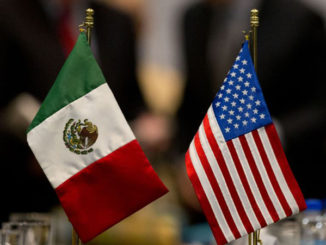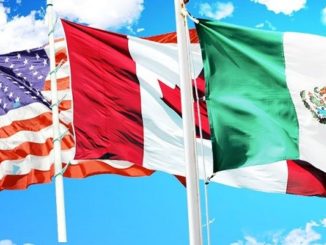
by Rich Cooper, George W. Bush Institute
There’s an old adage that says good fences make good neighbors. While there is always plenty of debate about where fences should be in terms of protecting the sovereignty of a nation and its people, if you were seated in the audience at the March 26 Business Horizon Retreat in Dallas, Texas, hosted by the U.S. Chamber of Commerce Foundation and the Bush Institute, you probably walked away thinking about how our borders are fading lines on a map in what has become a truly interdependent, highly technical, and always innovative economic force.
The United States, Canada, and Mexico are the proud and joint owners of probably the best piece of real estate on the planet, not only from a natural resource standpoint but in terms of possessing the developed infrastructure and talent pool to capitalize on our advantages. As rich and bountiful as our resources may be, however, they are not without their limits and challenges.
Our shared North American history records that we’ve had our past conflicts on borders and other issues, but today, there is far more that unites this continent (in promise, possibility, and potential) than divides it. Abraham Lincoln’s sage words that “a house divided against itself cannot stand” certainly apply far beyond the borders of our nation, speaking to a greater opportunity—and challenge—for the North American continent.
In a globalized world, where commerce is the ultimate competition, what we do together across the North American borders can give us the strength, security, and resolve to make even greater things happen. That can be in expanding our market, educating the next generation of workers, and building opportunities for every person who wants to work hard to realize their entrepreneurial dream. At the core of that is free trade. Consider a handful of facts showing the power of trade between the North American countries:
Every day, the United States does $3.2 billion in trade with Canada and Mexico. That’s $1.2 trillion annually, making Canada and Mexico our 1st and 3rd largest trading partners, respectively;
- In just over two decades from when NAFTA was enacted, intraregional trade within North America increased from 41% in 1990 to 48% in 2011. That is equal to U.S. trade with Japan, China, Korea, South Africa, Brazil, Russia, and India combined.
- U.S. trade with Canada and Mexico supports almost 14 million jobs (which is 1 in 10 private sector jobs), 5 million of which can be attributed to the increase in trade as a result of NAFTA;
- The advanced industries—aerospace, automotive, electronics, machinery, pharmaceuticals, and precision instruments—account for 47% of all trade in North America;
- In 2012, Canada and Mexico purchased $458 billion in U.S. manufactured goods; and
- The energy trade between the United States, Mexico, and Canada equals $108 billion and is growing.
When you think of the world’s spheres of influence (like Asia, Europe, Africa, and so forth), few come close to matching these North American capacities or capabilities. Success, however, can never be assured when there is ready and capable competition out there planning to take you on in the marketplace.
In hearing the various international presenters at the Business Horizon Retreat, including former President George W. Bush, it’s obvious that if we are to become the economic force we want to be in the 21st century and beyond, we, on the North American continent, cannot allow our opportunities to be defined or restricted by a zip code or geographic border.
Like freedom, economic opportunities can yield boundless possibilities for cooperation and collaboration among different people who have big ideas, even bigger dreams, and believe in a brighter future for their children and their countries. Energy, education, innovation, free trade, and free enterprise have fueled our history-making progress to this point, and if we use these things wisely, there is no border to the opportunities available to all of us who are proud to call this continent home.
Rich Cooper is vice president of research and emerging issues at the U.S. Chamber of Commerce Foundation in Washington, D.C. His organization hosted an event at the Bush Institute last week, exploring the ways in which the United States, Mexico, and Canada can better integrate their economies.



